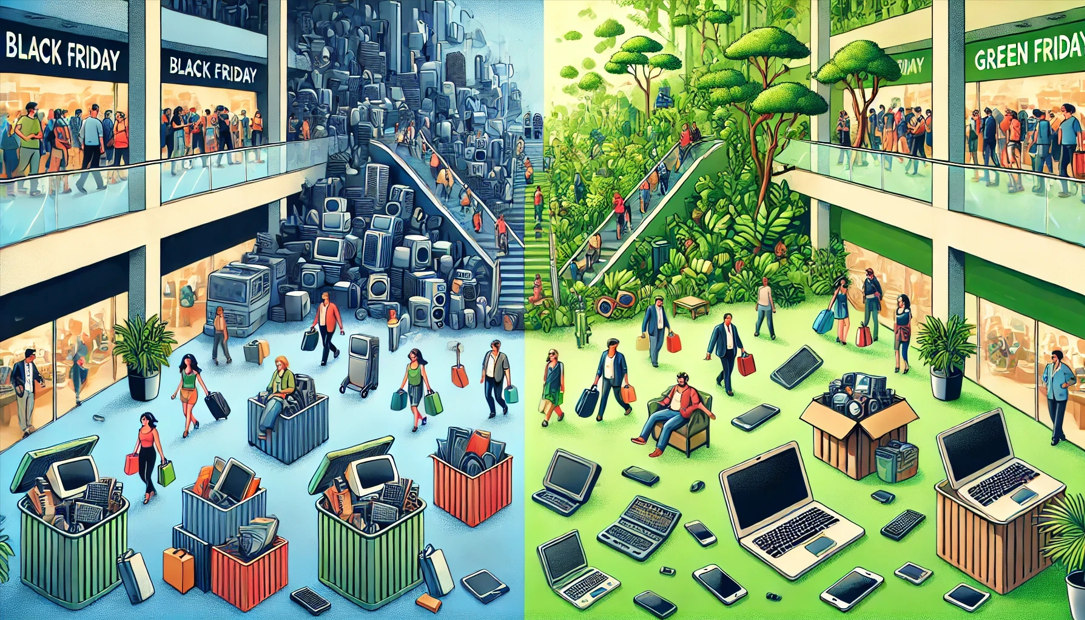As the days grow shorter, winter coats come out of the closet, and the last weekend of November approaches fast. For most of us, Black Friday has become a well-known phenomenon: retailers offer massive discounts, and consumers rush to grab deals as if it’s their last chance to empty the shelves. The commercial world is in full swing, but what does this shopping craze mean for sustainability? How does the rise of Green Friday fit into this, and how can we make more conscious choices during the holiday season?
Black Friday: Complete Shopping Frenzy
Black Friday originated in the United States and traditionally marks the start of the Christmas shopping season. Today, this shopping event has spread worldwide, driving millions of new purchases in just a short period. For consumers, Black Friday can be a chance to save money, but this mass consumption event also has a downside.
Green Friday: A Sustainable Alternative
As a response to Black Friday, we now see the rise of Green Friday.
The idea? Buy less, reflect more—focusing on what we already have and making more conscious choices. Green Friday is promoted by businesses and organizations as an alternative that emphasizes sustainable values. Instead of pushing sales of new products, it promotes conscious consumerism and recycling.
Green Friday offers a different perspective on holiday shopping, encouraging reuse, repair, and recycling of old products. Companies that support Green Friday encourage consumers to think about the impact of their purchases and how they can contribute to a better world.
The Impact of Overconsumption on E-Waste
The holiday season often triggers a wave of new electronics purchases. Think of smartphones, tablets, laptops, and gadgets, which are among the most popular gifts. But what happens to the old devices that are no longer needed? Overconsumption contributes to a growing mountain of e-waste. Globally, we produce over 50 million tons of electronic waste each year, and this number continues to rise (Source: United Nations University). A large portion of this waste ends up in landfills, causing valuable raw materials like gold and silver to go to waste. This is a missed opportunity because through refurbishment and recycling, we can extend the life of products and recover many of these materials.
4 Tips for Responsible Gift Shopping
How can we turn the tide and make more sustainable choices when buying Christmas gifts?
Here are four tips for more responsible holiday shopping:
Buy Second-Hand
Websites like Marktplaats and refurbished stores offer excellent pre-owned and refurbished devices. A second-hand gift can be just as valuable as a new one.
Choose Quality Over Quantity
A well-thought-out gift that lasts for years is more sustainable than impulsive purchases that end up in the trash after a year.
Recycle Your Old Electronics
Bring old devices to a certified recycling service.
Whale Recycling ensures that materials are safely and responsibly processed, and that personal data is securely destroyed.
Consider Gifts with Sustainable Value
Think beyond physical products—consider subscriptions, experiences, or donations to a good cause.
Conclusion: Make Conscious Choices This Holiday Season
Whether you choose Black Friday or Green Friday, the decision is in our hands. By making mindful choices, we can make a difference and contribute to a more sustainable world, even during the busy holiday season. Let’s make this time of year not just about gifts, but also about responsibility—because those two can go hand in hand.
WHALE take care of IT
Sources
United Nations University – Global E-Waste Monitor 2020

Cycling for the Sophia Children’s Hospital
Whale Recycling and Krommenhoek Metals are pushing hard for charity during Sports for Sophia 2025!
Lees meer
How Sustainable Is the Internet?
How Sustainable Is the Internet?
Lees meer
Recordprijzen voor Goud en Zilver
Record Prices for Gold and Silver
Lees meer